#Babar khan writes
Text
Someone says: "When you give unnecessary importance to people, they take your importance as unnecessary."
I said: "Importance doesn't mean you take someone for granted, it's all about a matter of priority. So if you give a wise person your priority, he or she won't let you down that's what i believe."
#attention
1 note
·
View note
Text
How Imran Khan became the man set to 'lead Pakistan into the future'
In the 1990s, when Pakistani journalists were still permitted to come to India, one of Pakistan’s most respected political commentators and a truly decent human being, the late M B Naqvi, was approached by an Indian news magazine to write a profile of Imran Khan.
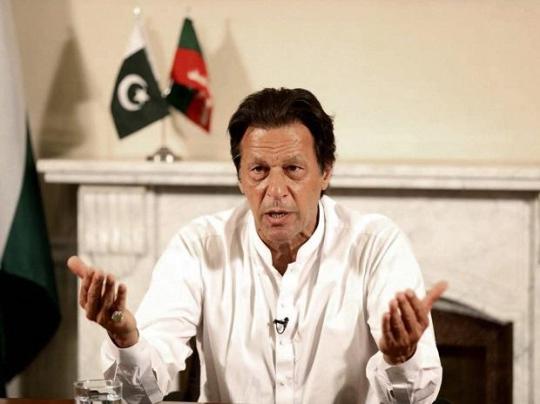
The context? Khan was Pakistan’s hottest property, one of its most colourful personalities, and Indians were riveted by the charmed life he seemed to lead – a cancer hospital in his mother’s name, institutions of learning and the first forays into politics, but with a seemingly liberal and often confused agenda.
“Imran Khan,” asked the gentle Naqvi: “You want a profile of Imran Khan?” Incredulously, he added: “But he’s a duffer.”
That was then and this is now. Khan has undergone a comprehensive metamorphosis, burying most of his socialite past and emerging as the man who will take Pakistan into the future.
Let us be clear. Whatever his promises on ‘naya Pakistan’ Khan still has to answer questions at the Election Commission of Pakistan on a petition last year by Akbar S Babar, a former party colleague who fell out with him. Babar alleged that READ MORE
1 note
·
View note
Link
PDM to march to ECP's office in Islamabad on Jan 19 for 'decision' on PTI foreign funding case PML-N spokesperson Marriyum Aurangzeb said on Wednesday that the party, under the umbrella of the 10-party opposition alliance Pakistan Democratic Movement (PDM), would take out rallies from different areas of Rawalpindi and Islamabad on Jan 19 that would merge into one big rally before heading towards the office of the Election Commission of Pakistan (ECP) in the capital. Addressing a press conference in Islamabad along with other party leaders, she said the rally was being organised to “get a decision from the ECP that it is not giving since 2014”. She was referring to a foreign funding case against the PTI, which was filed in Nov 2014 by Akbar S. Babar, a founding member of the ruling party. “The protest that the PDM is going to do on Jan 19 [is being done] to take the decision that has already been made today when the PTI has accepted that illegal funding has come through 23 foreign-funded accounts, [that] illegal funding could have been done through agents. [The PTI] accepted that money was gotten illegally through 23 foreign funded accounts that were not declared accounts and that money was [deposited] in PTI accounts [through cheques]. “Signs of President [Dr Arif Alvi], Sindh Governor [Imran Ismail] and Imran Khan sahib himself [along with] other PTI leaders are present on those cheques,” she claimed. PTI’s explanation In an apparent departure from its stance of denying any illegal funding from the United States, the PTI had on Wednesday, come up with an explanation that if any funds were collected illegally through two US companies registered after Imran Khan’s written instructions, the responsibility lies with their agents managing the two limited liability companies. The PTI said in its reply submitted to the Election Commission that “any contribution that has been collected by the agent which may be questionable would be beyond the scope of the work/responsibility/instructions given by the principal (respondent)”. “The principal has given clear instructions and if the agent goes beyond those instructions without disclosing it to the principal, without seeking ratification of those acts and without even sending that money to the principal, then it is submitted that the principal will not be liable under section 228 and not admit/certify such contents. The fact that the principal neither had knowledge nor has received the proceeds exhibits the bona fide of the principal,” the document carrying PTI’s reply went on to argue. The party adopted the latest stance in a written reply to a questionnaire given to it by the scrutiny committee of the ECP, sources said. The ECP committee met to continue scrutiny of PTI accounts under fresh directives to expedite the process, which has been going on since March 2018. In the presser today, Aurangzeb said that the PTI has “accepted the decision that ECP is not giving since 2014” and the PDM workers would go to the commission’s office on Jan 19 to take that decision from it. “The case was registered in 2014. What reason does the ECP have [to delay a verdict] when the PTI has accepted that agents did illegal funding? They should be ready to write the judgement,” she further said. The PML-N spokesperson said that all routes of the rally had been decided and all preparations had been completed. “[One] rally will start in Islamabad and head towards the ECP office. The Pindi rally will start from Nawaz Sharif Park and will go to the commission through Club Road,” she said, adding that rallies taken out from other areas of the district would merge at Kashmir Chowk and head to the ECP office from there. “PML-N Vice President Maryam Nawaz will preside over the rally and all PDM leaders will be there.” https://timespakistan.com/pdm-to-march-to-ecps-office-in-islamabad-on-jan-19-for-decision-on-pti-foreign-funding-case/8728/
0 notes
Photo
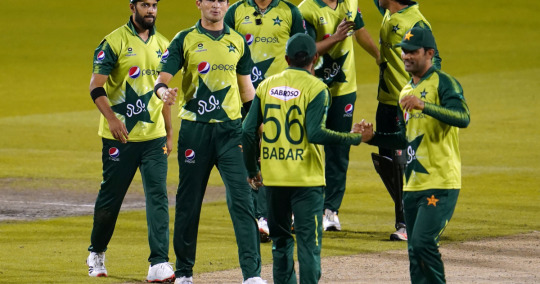
ICC awards: Fans baffled as no Pakistan player makes the cut

The absence of Pakistani players from the International Cricket Council’s (ICC) Awards of the Decade has made former players question the sport’s world governing body’s “credibility and transparency” and left Pakistani social media in flames.
Indian captain Virat Kohli picked up the Male Cricketer of the Decade Award while Australia all-rounder Ellyse Perry swept the women’s honours when the awards were announced on Monday.
However, no players from Pakistan managed to win any of the 10 individual awards or make it to the Test, One-Day International or T20 team of the decade, making it the only major Test-playing nation to win nothing at the awards.
According to the ICC, an academy of journalists, broadcasters, analysts and former players cast 90 percent of the votes while fans across its digital platforms decided the remaining 10 percent.
However, a member of the voting academy told Al Jazeera that the bigger chunk of voting came from the fans that ultimately decided the outcome.
“If the ICC wants to retain any credibility for such awards in the future it must show some transparency and reveal what percentage of the votes were cast by fans ,” former Pakistani fast-bowler Umar Gul told Al Jazeera.
In September, Gul, with 85 wickets in 60 T20s, was placed at the top of the ICC’s all-time top 10 T20 bowler’s list that featured four other Pakistani players – but none of them made the cut at the ICC Awards.
#DidYouKnow that FIVE Pakistan bowlers feature in the all-time list of the @MRFWorldwide ICC T20I Rankings 🤯
Two of these 🇵🇰 players were a part of the 2007 @T20WorldCup. Guess who? 🧐#T20TakesOff pic.twitter.com/YFs1ZyxuWh
— ICC (@ICC) September 13, 2020
“It’s bewildering that players like Saeed Ajmal, Shahid Afridi, Younis Khan, Yasir Shah and Babar Azam are not anywhere in these awards,” Gul said, adding that most of these were top performers across different formats during the past decade.
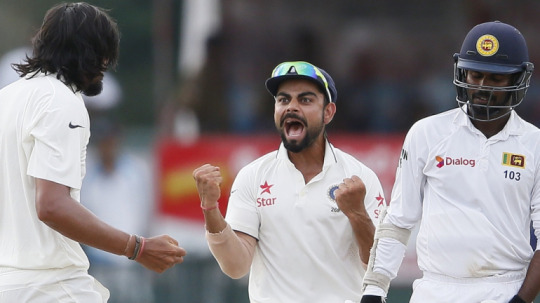
Indian captain Virat Kohli picked up the Male Cricketer of the Decade Award while Australia all-rounder Ellyse Perry swept the women’s honours when the awards were announced on Monday
“One can understand the results if the majority of the votes come from the fans. The sheer number of voters from India can easily nullify votes from Pakistan. And given the political tensions between the countries, it would not be surprising to find Indian fans outvoting Pakistani players on purpose.”
The ICC has not responded to Al Jazeera’s request for comment on the awards, while a spokesperson for the Pakistan Cricket Board declined to make a comment.
“I think the ICC has announced the IPL (Indian Premier League) team of the decade, instead of naming a world cricket team of the decade,” said former Pakistan fast bowler Shoaib Akhtar.
TYPO Error They forget to write IPL-T20s team for the decade
— Rashid Latif ®️🇵🇰🌹 (@iRashidLatif68) December 27, 2020
India’s captain Kohli also won the ODI player of the decade in addition to being named in the teams for all three formats.
Following the announcement, several fans and analysts pointed out that Pakistan captain Azam, who has been among the top batsmen in ODIs and T20s for the past three years, and leg-spinner Shah, who became the fastest to get 200 Test wickets, deserved to win.
India is the only country to have at least two players named in all men’s and women’s teams, a move that Rishad Mahmood, sports editor of Pakistan’s Dawn newspaper, said “smacks of bias from the ICC”.
“Not many critics or former players will take the ICC awards seriously as the organisation has lost its credibility as a ‘fair and neutral’ governing body,” Mahmood told Al Jazeera.
@TheRealPCB Whosoever came up with this novel @ICC Awards of the Decade idea has no understanding of cricket and with it its dynamics. politics and sensitivities! What a mess! Shame on ICC and there anti Pakistan agenda. pic.twitter.com/712n3gK25L
— Abdul Majid Bhatti (@bhattimajid) December 27, 2020
“I don’t think Pakistan’s budding cricketers will be discouraged by the awards as they’re aware of the merits and demerits of such futile exercises and the flawed working of the ICC.”
Echoing those comments, Gul added that although the omission hurt and angered Pakistani fans, the players would not let it affect their performance.
“Players do look forward to being recognised and being on the honour’s lists and it serves as a motivational factor. But as professionals, they also know how to move on,” Gul told Al Jazeera.
In the past decade Pakistan beat:
-ENG in UAE 2011
-IND in IND 2012
-SA in SA 2013
-ENG in ENG 2016.
-Won Champions Trophy 2017
-Oh And were ranked No. 1 in Tests and T20s.
Sorry @ICC. The fact that you put 5 teams together without a single Pakistani player is pretty lame.
— Aatif Nawaz (@AatifNawaz) December 27, 2020
#sport Read full article: https://expatimes.com/?p=16161&feed_id=25650 #asia #cricket #news #pakistan #sports
0 notes
Text
With the compliments of, The Directorate General Public Relations,
Government of the Punjab, Lahore Ph: 99201390.
No.1989/QU/Mujahid
HANDOUT (A)
CM INAUGURATES DEVELOPMENT WORK OF JOURNALIST COLONY’S F-BLOCK
LAHORE, December 14:
Chief Minister Punjab Sardar Usman Buzdar inaugurated the development work of F-block of journalist colony on Monday and announced to solve the problems of the media community on a priority basis.
Addressing the ceremony, the CM said the citizens of Lahore demonstrated a socially responsible behaviour on Sunday by remaining aloof from the meeting. I thank the Lahoreiites as they did not become part of illegal activity of the opposition which was not only unlawful and irresponsible but illogical in the backdrop of prevailing corona situation, he emphasised. Holding a public meeting is totally illogical as the death rate is increasing due to corona. The CM announced to complete the development work in his supervision adding that he will visit again to review the completed tasks. The journalist colony's problems will be solved on a priority basis as it is my home as well, he said. SACM Firdous Ashiq Awan has been deputed to solve the problems of the journalist colony and she will present a report after taking concrete steps in this regard, the CM said and announced to start phase-II of the journalist colony.
PM Imran Khan has announced to give sehat insaf cards to every citizen and universal health coverage program is going to be started in the province, added Usman Buzdar. The half of the population will be provided health coverage this year and every citizen will enjoy this facility in Punjab by 2021, he stated. Pakistan will be among the few countries enjoying health coverage for all the citizens. Speedy development is being made on the mega-development package announced for Lahore. Meanwhile, a separate development package is chalked out for every district, he added. The government did not believe in lip-service as it initiated genuine projects for the composite development of the province to provide facilities to every citizen, he further said. LPC president Arshad Ansari thanked the CM for taking personal interest for solve the problems of the journalists adding that incumbent government is pro-journalist which has retrieved land from illegal occupants after 14 years. Secretary Information briefed the CM about the development work.
SACM Dr Firdous Ashiq Awan, Commissioner Lahore, DG LDA, LPC secretary Babar Dogar and a large number of journalists attended the ceremony.
****
No.1990/QU/Mujahid
HANDOUT (A)
CM THANKS LAHOREIITES FOR IGNORING THE PDM’S ANARCHISTIC DESIGNS
LAHORE, December 14:
Chief Minister Punjab Sardar Usman Buzdar has thanked the Lahoreiites for ignoring the anarchist political designs of the PDM adding that so-called claimants of the city of Lahore have been badly exposed as the citizens have rejected their politics in toto.
In a statement, the CM said December 13 has also passed and nothing happened. The people have totally rejected the negative politics of the rejected elements, he added. The political cabal tried to create unrest through their corner meeting which ended in chaos. The nation witnessed the failure of political designs of the PDM at Minar-e-Pakistan. He emphasised that accountability of the corrupt PDM elements will be done and they will have to return the looted money. Regrettably, those who plunged the country into crises are hiding abroad with their looted money, he added. Usman Buzdar stated the PDM leadership is conspiring against the national development and is unnerved as the people have fully recognized their negative designs. The corrupt opposition is following a catastrophic path to avoid the grip of the law and those who filled their coffers through corruption have no value before the people, concluded the CM.
****
No.1991/QU/Mujahid
HANDOUT (A)
CM PRAYS FOR EARLY RECOVERY OF MAULANA TARIQ JAMIL
LAHORE, December 14:
Chief Minister Punjab Sardar Usman Buzdar has prayed for early recovery of famous religious scholar Maulana Tariq Jamil and prayed to Almighty Allah to grant good health to Maulana Tariq Jamil.
****
No.1993/QU/Mujahid
HANDOUT (A)
CM CONDOLES DEATH OF HELI PILOT’S MOTHER
LAHORE, December 14:
Chief Minister Punjab Sardar Usman Buzdar expressed a deep sense of sorrow over the death of the mother of Col. (R) Safdar Hussain Tiwana, helicopter pilot of the Punjab government. He offered Fateh for the departed soul and prayed that may Allah Almighty grant courage to the bereaved family to bear the loss with equanimity. Chief Pilot Col (R) Shafiq was also present.
****
No.1992/QU/Akram
HANDOUT (A)
FAILED LAHORE MEETING A WAKE-UP CALL FOR PDM--FIRDOUS ASHIQ AWAN
LAHORE, December 14:
Special Assistant to CM Dr Firdous Ashiq Awan has said the citizens of Lahore have shown a mirror to the PDM as the failed power show of 11- party alliance is a wake-up call.
In a statement, she said heir-apparent of the house of sharifs and her bondwomen should read the writing on the wall as the last nail has been put in the political coffin of the corrupt cabal. Participation of a few thousand spectators is a slap on the face of PDM as December 13 has passed after December 8 and nothing has happened, she said. She advised the PDM to shun negative politics if it has a bit of shame as the failed Lahore meeting has again exposed it. The PDM has been cut to size as the meeting place gave a deserted look. It was illogical to hold a public meeting in the backdrop of corona surge and the cabal is facing the consequences of its foolishness, she added. Meanwhile, 14 patients died and 329 new cases have been reported during the last 24 hours while the number of patients has reached to 62228 in Lahore only. The total number of corona patients in Punjab is one lac, 27 thousand and 541 and 3365 have lost their lives due to corona, concluded the SACM.
****
0 notes
Text
Sarfaraz Ahmed in the Pakistan Cricket team (T20I)
Pakistan team has just arrived in Australia for three T20Is. Which will start from 3rd November which will then be followed by two Test matches starting from Nov 21st.
The Pakistan T20 team will be led by batting sensation Babar Azam. While the test side will be under the hood of the veteran batsman Azhar Ali after former wicket-keeper/captain, Sarfaraz Ahmed was relieved of his duties from all three formats while being replaced by Muhammad Rizwan with the gloves.
While the removal of Sarfaraz Ahmed seemed to be coming from a long way, especially with his dismal performances and lack of impact with the bat of late, an uproar has been created demanding justice for the captain of the defending PSL champions, Quetta Gladiators.
His removal from the Test and One Day sides was perhaps inevitable and is quite undebatable, especially with Muhammad Rizwan scoring heaps of runs in both formats. The main problem lies in the impact of his presence in the T20I side. I try here to dissect his numbers in the T20 format.
Sarfaraz Ahmed Statistics
Statistics for Sarfaraz Ahmed by Batting Position

Sarfaraz Ahmed stats by Batting position
It’s no surprise that Sarfaraz Ahmed has never been at home while batting down the order whether in the One Day or T20 format and his number reflect that. Especially so in the T20 format. And the most worrying part is that his strike rate falls considerably as he bats down the order. Something that is opposite to what you would expect to see. But at the same time, his numbers at the top of the order are staggering. As solid as he seems at the top of the order despite his troubles picking variations at times (in his defense, a general problem for Pakistan of late) the way he plays spin in the middle order and his knack to rotate the strike, he perhaps still should find a place in the Pakistan side.
Batting Averages for Pakistan in the Last Two Years
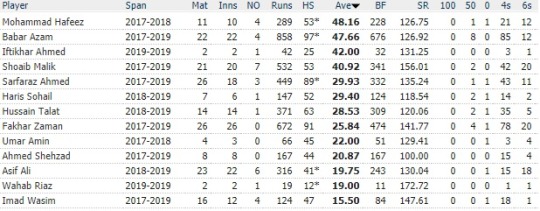
Best Batsmen for Pakistan in the Last Two Years
One of the more unfortunate things for Pakistan is that three of the top 5 batsmen with the highest averages for Pakistan in the last two are no longer in the squad. These were key players that helped put Pakistan number 1 in the ICC rankings.
If you filter the numbers for a minimum of 5 matches played, Sarfaraz Ahmed falls as the 4th best batsman Pakistan have had. While his strike rate is the second highest of the top 7 with the highest averages. Although it is important to note that his average falls 27% from Shoaib Malik at number 3.
Batting Averages for Pakistan in the Last One Year

Best Batsmen for Pakistan in the Last One Year
Sarfaraz’s struggles have been prominent in the last one year where he’s barely made par. And that with a significant drop in his strike rate. While this was the primary reason for his omission, his overall impact as a player and as captain was arguably greater than what these numbers show. Here is a dissection of these innings:
In these 10 matches he only came in to bat 6 times. In one of those he didn’t face a ball. While in another, he came in to bat at number 7 with 6 overs to go.
Of the remaining 4, Pakistan won one where he made his best in this time period of 34 and his partnership with Hafeez won Pakistan the match. The rest of the three matches were the most recent against Sri Lanka where all three times he came in to bat on a slow wicket where he got a start in each with failure to convert.
The prominent omission from the future plans of the PCB seems to be Muhammad Hafeez. Who, despite the common belief that Babar Azam is the best batsman for Pakistan in T20Is, has shown with numbers that he has been by far, the go-to guy for Pakistan in this format.
Replacing Sarfaraz Ahmed
For those of us who’ve seen the National T20 cup in Faisalabad, it seems obvious that the player of the tournament, Muhammad Rizwan would deserve a place in the T20 side. The Peshawar born wicket-keeper/batsman scored 215 runs in 6 matches at an average of 43 for KP.
Sarfaraz on the other hand scored 131 runs in 5 matches at 26.20. Finishing as the joint second highest run scorer for Sindh, 5 runs behind Khurram Manzoor. Both played at nearly the same Strike rate in the tournament. While Rizwan is probably the best keeper in the country, Sarfaraz is certainly not far behind. Especially with him working particularly on his fitness of late. As a batsman, both lack the ability to hit quick cameos. Sarfaraz Ahmed however, definitely has the edge while batting in the middle order. Which is due to his knack of keeping the scoreboard ticking and keep the spinners on their heels.
Captaincy
The numbers as a captain for Sarfaraz Ahmed both in domestic and in international T20s have been staggering. Apart from 11 consecutive series wins, a record on its own, under Sarfaraz Ahmed, Pakistan won 78.4% of their matches. Which is the second highest in the history of T20I cricket, behind Asghar Afghan’s 80.4% which mostly includes Associate Nations.
Pakistan won series in England, West Indies, New Zealand and a tri series against Zimbabwe and Australia in Zimbabwe apart from wins at home and in the UAE.
Sarfaraz also has the highest win percentage in the PSL. Under his captaincy, Quetta Gladiators have played three out of four finals and have won the latest edition of the tournament. Quetta Gladiators, under the captaincy of Sarfaraz, also have the highest win percentage in the PSL. They have won 26 out of 43 matches at a win percentage of 61.9%.
Finally for the argument that it was the players who won the matches and not the captain. I would argue that the same can be said for Imran Khan, in the 1992 world cup. He scored 185 runs in 8 matches at an average of 30.83 while picking up 7 wickets at 35.9 a-piece. Getting the best out of his players and using them tactically at the best place possible is the main job of the captain. Something Sarfaraz has done well throughout his T20 career. It would be arrogant to write off the high number of wins with different teams as mere coincidence.
The replacement of Sarfaraz Ahmed has good arguments on both sides. I just argue that it’s not wise to replace an excellent captain on a minor slump in form. Especially with the World T20 less than a year away. And if he was going to be replaced, it should have be with someone who has experience of captaincy and has a resume to back up his elevation to captaincy. The National T20 has shown how much the current captain, Babar Azam needs to learn and has cemented how good a limited overs captain Imad Wasim is. I would just hope that for Pakistan’s sake, Babar can learn on the job quick.
from WordPress https://ift.tt/2QqXLGZ
via IFTTT
0 notes
Text
Heading to Pakistan, remember us in your prayers: Bangladesh player

Left-arm pacer Mustafizur Rehman, who is part of the Bangladesh squad traveling to Pakistan, posted a cryptic tweet before team's departure which raised a few eyebrows.
On Wednesday evening, Rahman took to Twitter to post a selfie along with his teammates before the team's departure and asked his followers to pray for them, writing: "Heading to Pakistan. Remember us in your prayers."
Bangladesh were earlier reluctant to travel to Pakistan. However, the officials of both the teams met in Dubai and it was after many deliberations, the Bangladesh Cricket Board (BCB) agreed to send their team for a cricket series.

Bangladesh Cricket✔@BCBtigers
Bangladesh squad have arrived in Lahore, Pakistan yesterday (January 22) at 11:30 pm (Bangladesh time).1,85810:36 AM - Jan 22, 2020Twitter Ads info and privacy237 people are talking about this

Mustafizur Rahman✔@Mustafiz90
Heading to Pakistan. Remember us in your prayers. #PAKvBAN

21.4K5:53 AM - Jan 22, 2020Twitter Ads info and privacy6,466 people are talking about this
Bangladesh will be playing three T20Is, two Tests and an ODI in Pakistan between January and April. The T20I series will be played from January 24-27 in Lahore, followed by the first Test from February 7 to 11.
Bangladesh will then return to Pakistan in April for the one-off ODI which will be played on April 3 and the second Test from April 5-9.
Senior players like Mushfiqur Rahim decided against traveling to Pakistan citing personal reasons. After that, five members of the Bangladesh coaching staff also pulled out of the tour.
Pakistan have also recalled the experienced duo of Mohammad Hafeez and Shoaib Malik, along with pacer Shaheen Afridi for the T20I series.
Squads:
Bangladesh: Mahmudullah (Captain), Tamim Iqbal, Soumya Sarkar, Naim Sheikh, Najmul Hossain Shanto, Liton Kumer Das, MD Mithun, Afif Hossain Dhrubo, Mahedi Hasan, Aminul Islam Biplob, Mustafizur Rahman, Shafiul Islam, Al-Amin Hossain, Rubel Hossain, Hasan Mahmud
Pakistan: Babar Azam (captain), Ahsan Ali, Amad Butt, Haris Rauf, Iftikhar Ahmed, Imad Wasim, Khushdil Shah, Mohammad Hafeez, Mohammad Hasnain, Mohammad Rizwan (wicketkeeper), Musa Khan, Shadab Khan, Shaheen Shah Afridi, Shoaib Malik, Usman Qadir
Read the full article
0 notes
Text
Pakistan is making concessions to religious extremists. What’s the cost?
By Pamela Constable, Washington Post, December 3, 2017
ISLAMABAD, Pakistan--In the past 10 days, two dramatic events--the government’s capitulation to a violent protest by radical Muslims and the release from house arrest of an anti-India militia leader--have crystallized the sway that hard-line Muslim groups increasingly hold in Pakistan, a nuclear-armed state whose military leaders claim to be fighting extremist violence.
The freeing of Hafiz Saeed, an Islamist cleric accused of masterminding a deadly rampage in Mumbai nine years ago, came as no surprise. Although denounced as a terrorist by the United Nations and the United States, Saeed enjoys a large following in Pakistan as a fiery champion of Muslim rights in Kashmir, the disputed border region with India. He has been repeatedly detained and released by the courts, a sign of Pakistan’s often contradictory efforts to secure at once domestic Muslim loyalty and international support.
In contrast, the chaotic scenes in late November of Muslim demonstrators throwing stones at police near the capital, then rising up across the country to protest a minor change in an electoral law, shocked the nation and raised the specter of mass religious unrest--a permanent worry in an impoverished nation of 207 million, 95 percent of whom are Muslim and most from the same Sunni branch as the protesters.
But the quick resolution of the problem also raised worrisome questions about the long-term capability of the government of Pakistan, a fragile democracy whose prime minister was recently ousted, to push back against religious extremism and the risks of bringing in the powerful military to settle civilian disputes.
Saeed was released Nov. 24 after a provincial court found “insufficient evidence” to link him to the four-day Mumbai terrorist attack in 2008 that killed 164 people. This time, the court action came amid intense pressure from the Trump administration on Pakistan to prove it is not harboring Islamist militias. It was also met with especially sharp denunciations from India.
American officials demanded that Saeed--who was detained in January under U.S. pressure--be arrested again. The U.S. Embassy here expressed “serious concerns” over his release and charged that his now-disbanded militia, Lashkar-e-Taiba, was responsible for the deaths of “hundreds of innocent civilians” in numerous terrorist attacks. Six victims in the Mumbai bombing and shooting attack, which Indian and U.S. officials believe was carried out by Lashkar-e-Taiba commandos, were U.S. citizens.
In Pakistan, though, Saeed remains a force to be reckoned with and a political survivor who has continually reinvented his movement, changing its name and founding a charitable offshoot that helps people in emergencies. In August, after years of denouncing electoral politics, he formed a political party, and its candidate performed better than expected in a race for Parliament. After he was released, he triumphantly returned to his Friday pulpit in Lahore and demanded that his name be removed from the U.N. sanctions list.
While Saeed’s supporters were celebrating his return to the public arena, a tense drama was playing out in the capital between another religious firebrand and government security forces. The confrontation that erupted early Nov. 25 quickly escalated into a nationwide protest surge and ended 24 hours later in triumph for the protesters and embarrassment for the government, which accepted virtually all their demands.
In contrast to Saeed, an established though controversial leader in Pakistan, the recent protests thrust a little-known, rabble-rousing cleric into the news. Within 48 hours, Khadim Hussain Rizvi had exhorted his supporters to violence, sparked mini-protests across the country, stared down civilian officials, bargained hard with the army--and become a household name.
Unlike Saeed, Rizvi is not associated with armed militant groups. His movement is built around reverence and love for Muhammad as Islam’s final prophet. On Friday night, just days after the angry protests subsided, Pakistani Muslims everywhere jubilantly celebrated Muhammad’s birthday, thronging streets hung with dazzling lights and gathering around tents where devotees recited chants glorifying him.
But Rizvi’s movement is also harsh and extreme in its views. It has built a cult around a man who assassinated a provincial governor for religious reasons, believes blasphemers should be executed and crusades against Ahmedis, a small religious minority that follows a later prophet. The protests were raised against a change in electoral laws that softened requirements for candidates to avow Muhammad as the final prophet--a move Rizvi’s group suspected was aimed at increasing the political participation of Ahmedis.
The price of pacifying Rizvi and his followers, many Pakistani leaders and commentators said, may be the emboldening of other fanatical Muslim groups, a further weakening of civilian authority, an increased potential for the military to intervene, and a rise in both sectarian hatred and conflict between rival Sunni schools. Some warn that the foundations of Pakistan’s fragile democracy have been shaken.
“This is a steep descent into a bottomless pit for the state and society,” said Farhatullah Babar, a liberal senator. “It is the abject surrender of the constitutional government to a lawless mob” whose leaders seek to gain power through the “facade of religion.”
Others suggest that the episode signifies a growing confluence of interest between hard-line religious groups and the military, whose leaders have vowed to stay out of politics but are known to be unhappy with the ruling party and its top electoral rival, the movement led by cricket legend Imran Khan.
Imtiaz Alam, writing Thursday in the News International newspaper, noted that the state, which once encouraged militant groups such as Saeed’s to fight in India and Afghanistan, has now abetted the domestic agenda of a fanatical strain within Pakistan’s large, mainstream Sunni group, the Barelvis. “The law of the jungle is to prevail,” he warned. “The state has left its citizens ... at the mercy of demons.”
1 note
·
View note
Text







1 note
·
View note
Text
Hakim Ajmal Khan
Ajmal Khan (or Hakim Ajmal Khan) (1863–1927) was an Indian physician specialising in the field of South Asian traditional Unani medicine as well as a Muslim nationalist politician and freedom fighter. Through his founding of the Tibbia College in Delhi, he is credited with the revival of Unani medicine in early 20th century India. Khan also recognised the talents of chemist Dr. Salimuzzaman Siddiqui, whose subsequent research into important medicinal plants used in the field gave it a new direction. A close associate of Gandhi, he participated in the Non-cooperation movement (Satyagraha), led the Khilafat Movement, and became the fifth Muslim[citation needed] President of the Indian National Congress during the 1921 session held in Ahmedabad, Gujarat. Khan was one of the founders of the Jamia Millia Islamia University, becoming its first chancellor in 1920 and remaining in office until his death in 1927.
Biography
Hakim Born in 1863, Khan descended from a distinguished line of physicians who had come to India during the reign of Mughal Emperor Babar. His family were all Unani doctors who had practiced this ancient form of medicine since their arrival in the country. They were then known as the Rais of Delhi. His grandfather, Hakim Sharif Khan, was physician to Mughal Emperor, Shah Alam and built the Sharif Manzil, a hospital-cum-college teaching Unani medicine.
Khan learnt the Quran by heart and as a child studied traditional Islamic knowledge including Arabic and Persian, before turning his energy to the study of medicine under the guidance of his senior relatives, all of whom were well-known physicians. To promote the practice of Tibb-i-unani or Unani medicine, his grandfather had set up the Sharif Manzil hospital-cum-college known throughout the subcontinent as one of the best philanthropic Unani hospitals where treatment for poor patients was free. He completed his Unani studies under Hakeem Abdul Jameel of Siddiqui Dawakhana, Delhi.
On qualifying in 1892, Khan became chief physician to the Nawab of Rampur. Hailed as "Massiha-e-Hind" (Messiah of India) and "a king without a crown", Khan, like his father, was reputed to effect miraculous cures and to have possessed a "magical" medicine chest, the secrets of which were known to him alone. Such was his medical acumen that it is said that he could diagnose any illness by just looking at a person’s face. Hakim Ajmal Khan charged Rs.1000 per day for an out-of-town visit but if the patient came to Delhi, he was treated free, regardless of his position in society. Khan proved to be the most outstanding and multifaceted personality of his era with matchless contributions to the causes of Indian independence, national integration and communal harmony.
He took great interest in the expansion and development of the native system of Unani medicine and to that end built three important institutions, the Central College in Delhi, the Hindustani Dawakhana and the Ayurvedic and Unani Tibbia College, which expanded research and practice in the field and saved the Unani System of Medicine from extinction in India. His untiring efforts in this field infused a new force and life into an otherwise decaying Unani medical system under British rule. Khan proposed the absorption of Western concepts within the Unani system, a view diametrically opposite to that adopted by physicians of the Lucknow school who wanted to maintain the system's purity.
As one of its founders, Khan was elected first chancellor of the Jamia Milia Islamia University on 22 November 1920, holding the position until his death in 1927. During this period he oversaw the University's move to Delhi from Aligarh and helped it to overcome various crises, including financial ones, when he carried out extensive fund raising and often bailed it out using his own money.
Nationalism
Khan changed direction from medicine towards politics after he started writing for the Urdu weekly Akmal-ul-Akhbar launched by his family. Khan also headed the Muslim team who met theViceroy of India in Shimla in 1906 and presented him with a memorandum written by the delegation. The following year, he was present at the Dhaka inauguration of the All India Muslim Leagueon 30 December 1906. At a time when many Muslim leaders faced arrest, Khan approached Mahatma Gandhi for help, thereafter uniting with him and other Muslim leaders such as Maulana Azad, Maulana Mohammad Ali and Maulana Shaukat Ali in the well-known Khilafat movement. Khan was also the sole person elected to the Presidency of the Indian National Congress, theMuslim League and the All India Khilafat Committee.
After partition
After the partition of India Khan's grandson Hakim Muhammad Nabi Khan moved to Pakistan. Hakim Nabi had learnt Tibb (medicine)[clarification needed] from his grandfather and opened 'Dawakhana Hakim Ajmal Khan' in Lahore which has branches throughout Pakistan. The motto of the Ajmal Khan family is Azal-ul-Allah-Khudatulmal, which means that the best way to keep oneself busy is by serving humanity.
Quotes
"The spirit of non-cooperation pervades throughout the country and there is no true Indian heart even in the remotest corner of this great country which is not filled with the spirit of cheerful suffering and sacrifice to attain Swaraj and see the Punjab and the Khilafat wrongs redressed." — From the Presidential Address, I.N.C., 1921 Session, Ahmedabad.[4]
Further reading
Hakim Ajmal Khan, the versatile genius, by Mohammed Abdur Razzack. Central Council for Research in Unani Medicine, Ministry of Health & Family Welfare, Govt. of India, 1987.
Hakim Ajmal Khan by Zafar Ahmed Nizami, Publications Division, Ministry of Information and Broadcasting, Govt. of India, 1988.[1]
Hakim Ajmal Khan(Indian freedom fighters series), by Shri Ram Bakshi. Anmol Publications, 1996. ISBN 81-7488-264-2.
Hakim Ajmal Khan (Hindi, Urdu and English Version) by Hakim Syed Zillur Rahman, National Book Trust, Government of India, New Delhi, India, 2004.
#Unani#Tibbia College#Salimuzzaman Siddiqui#Khilafat Movement#India#Hakim Ajmal Khan#Delhi#Ahmedabad
0 notes
Text
Hakim Ajmal Khan
Ajmal Khan (or Hakim Ajmal Khan) (1868–1927) was an Indian physician specialising in the field of South Asian traditional Unani medicine as well as a Muslim nationalist politician and freedom fighter. Through his founding of the Tibbia College in Delhi, he is credited with the revival of Unani medicine in early 20th century India. Khan also recognised the talents of chemist Dr. Salimuzzaman Siddiqui, whose subsequent research into important medicinal plants used in the field gave it a new direction.[3][4][5] A close associate of Gandhi, he participated in the Non-cooperation movement (Satyagraha), led the Khilafat Movement, and became the fifth Muslim[citation needed] President of the Indian National Congress during the 1921 session held in Ahmedabad, Gujarat.[6]Khan was one of the founders of the Jamia Millia Islamia University, becoming its first chancellor in 1920 and remaining in office until his death in 1927
Biography
Hakim Born in 1868 (17th Shawwal 1284), Khan descended from a distinguished line of physicians who had come to India during the reign of Mughal Emperor Babar. His family were all Unani doctors who had practiced this ancient form of medicine since their arrival in the country. They were then known as the Rais of Delhi. His grandfather, Hakim Sharif Khan, was physician to Mughal Emperor, Shah Alam and built the Sharif Manzil, a hospital-cum-college teaching Unani medicine.[8][9]Khan learnt the Quran by heart and as a child studied traditional Islamic knowledge including Arabic and Persian, before turning his energy to the study of medicine under the guidance of his senior relatives, all of whom were well-known physicians.
To promote the practice of Tibb-i-unani or Unani medicine, his grandfather had set up the Sharif Manzil hospital-cum-college known throughout the subcontinent as one of the best philanthropic Unani hospitals where treatment for poor patients was free.[10] He completed his Unani studies under Hakeem Abdul Jameel of Siddiqui Dawakhana, Delhi.[10]On qualifying in 1892, Khan became chief physician to the Nawab of Rampur. Hailed as "Massiha-e-Hind" (Healer of India) and "a king without a crown", Khan, like his father, was reputed to effect miraculous cures and to have possessed a "magical" medicine chest, the secrets of which were known to him alone.[10] Such was his medical acumen that it is said that he could diagnose any illness by just looking at a person’s face. Hakim Ajmal Khan charged Rs.1000 per day for an out-of-town visit but if the patient came to Delhi, he was treated free, regardless of his position in society.
Khan proved to be the most outstanding and multifaceted personality of his era with matchless contributions to the causes of Indian independence, national integration and communal harmony.[10]
He took great interest in the expansion and development of the native system of Unani medicine and to that end built three important institutions, the Central College in Delhi, the Hindustani Dawakhana and the Ayurvedic and Unani Tibbia College, which expanded research and practice in the field and saved the Unani System of Medicine from extinction in India. His untiring efforts in this field infused a new force and life into an otherwise decaying Unani medical system under British rule.[11][12] Khan proposed the absorption of Western concepts within the Unani system, a view diametrically opposite to that adopted by physicians of the Lucknow school who wanted to maintain the system's purity.[13]
As one of its founders, Khan was elected first chancellor of the Jamia Milia Islamia University on 22 November 1920, holding the position until his death in 1927. During this period he oversaw the University's move to Delhi from Aligarh and helped it to overcome various crises, including financial ones, when he carried out extensive fund raising and often bailed it out using his own money.[14][15]
Nationalism
Khan changed direction from medicine towards politics after he started writing for the Urdu weekly Akmal-ul-Akhbar launched by his family. Khan also headed the Muslim team who met the Viceroy of India in Shimla in 1906 and presented him with a memorandum written by the delegation. The following year, he was present at the Dhaka inauguration of the All India Muslim League on 30 December 1906. At a time when many Muslim leaders faced arrest, Khan approached Mahatma Gandhi for help, thereafter uniting with him and other Muslim leaders such as Maulana Azad, Maulana Mohammad Ali and Maulana Shaukat Ali in the well-known Khilafat movement. Khan was also the sole person elected to the Presidency of the Indian National Congress, the Muslim League and the All India Khilafat Committee.
Legacy
Before he died of heart problems on 29 December 1927 Khan had renounced his government title, and many of his Indian followers awarded him the title of Masih-ul-Mulk (Healer of the Nation). He was succeeded to the position of JMI Chancellor by Dr. Mukhtar Ahmed Ansari. Ajmaline, a class Ia antiarrhythmic agent and Ajmalan a parent hydride, are named after him.[16]
After partition
After the partition of India Khan's grandson Hakim Muhammad Nabi Khan moved to Pakistan. Hakim Nabi had learnt Tibb (medicine)[clarification needed] from his grandfather and opened 'Dawakhana Hakim Ajmal Khan' in Lahore which has branches throughout Pakistan. The motto of the Ajmal Khan family is Azal-ul-Allah-Khudatulmal, which means that the best way to keep oneself busy is by serving humanity.
Quotes
"The spirit of non-cooperation pervades throughout the country and there is no true Indian heart even in the remotest corner of this great country which is not filled with the spirit of cheerful suffering and sacrifice to attain Swaraj and see the Punjab and the Khilafat wrongs redressed." — From the Presidential Address, I.N.C., 1921 Session, Ahmedabad.[6].[7]
#Unani#Tibbia College#Salimuzzaman Siddiqui#Khilafat Movement#Jamia Millia Islamia#India#Hakim Ajmal Khan#Ahmedabad
0 notes
Text
Ghotki by-poll: PPP fears foul play, writes to CJP
Ghotki by-poll: PPP fears foul play, writes to CJP
ISLAMABAD: The Pakistan Peoples Party (PPP) on Saturday requested Chief Justice of Pakistan (CJP) Asif Saeed Khan Khosa to ensure free, fair and transparent by-election on a National Assembly seat (NA-205) in Ghotki as per the schedule of the Election Commission of Pakistan (ECP).
PPP Secretary General Farhatullah Babar wrote a letter to the chief justice, stating that ECP announced by-poll on…
View On WordPress
0 notes
Link
news in all oer the world click on this link and visit now
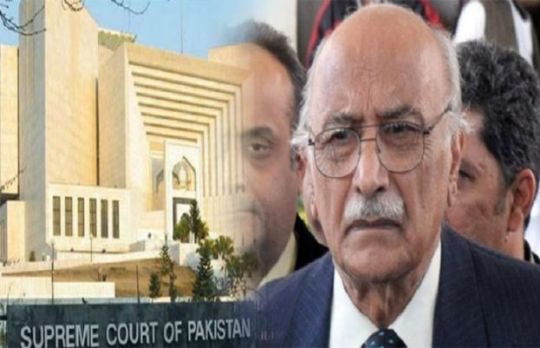
The report submitted states that the FIA had tried to "unearth the facts and bring truth to light, but the investigation has reached a dead end".
In a compliance report submitted to the Supreme Court on Saturday, the Federal Investigation Agency (FIA) has sought the help and guidance of the apex court in collecting sufficient evidence in the case concerning the manipulation of the 1990 elections and the implementation of the Supreme Court's landmark 2012 verdict on it.
The apex court will resume hearing a case regarding the implementation of the 2012 verdict on Monday (February 11).
On Jan 11, then former chief justice (r) mian saqib nisar, after accepting the plea of the family of the late Air Marshal Asghar Khan, had ordered fixing of the matter before a bench after his retirement.
A three-member bench of the apex court, consisting of Justice Gulzar Ahmed, Justice Faisal Arab and Justice Ijazul Ahsan, will take up the case on Feb 11.
On Dec 29, 2018, the FIA had suggested to the SC that it close the implementation case since it did not have enough evidence to launch a criminal prosecution against individuals named in the judgement.
In an earlier hearing, the court had decided that it was not satisfied with the conclusions reached by the FIA and asked the agency to submit a response to Khan's family's joint reply in which they opposed the suggestion to close the case.
In its report submitted today, the FIA said they had left "no stone unturned in tracing evidence relating to the disbursement of alleged money to politicians".
They said all important witnesses, including central figure retired Brig Hamid Saeed Akhtar, had been examined.
Bank records were scrutinised while statements of the concerned bank officers were also recorded. Politicians were also interviewed, the FIA has said.
As per the FIA report, the assistance of the Pakistan Electronic Media Regulatory Authority (Pemra), the National Accountability Bureau (NAB) and Ministry of Defence had also been sought. The report stated that over 190 television programmes were analysed and the defence ministry had been contacted to provide information regarding details required to find necessary evidence.
However, the investigation could not reach a logical conclusion as no Army officer gave any statement of handing over money to any private person directly.
It added that documents provided by retired Brig Hamid Saeed Akhtar showed that money was distributed in Sindh, but he had not disclosed the names of officers who actually distributed the money. Receipts of the money being received by politicians, which the brigadier had mentioned, were also not provided to the FIA.
As per the report, Brig Hamid said the receipts were sent to General Headquarters (GHQ), but when FIA asked retd Gen Asad Durrani, he denied having any information of such receipts.
The FIA added that despite the FIA writing to the defence ministry about the whereabouts of certain intelligence agency personnel, the intelligence agency team responsible for the distribution of funds in Punjab and elsewhere could not be ascertained.
Additionally, the FIA said that certain bank account details, which would complete the money trail needed for prosecution, had not been provided.
The report added that since the Army and intelligence officers were the "primary responsible" for the distribution of money to private individuals and politicians, splitting the investigation into two parts — namely the Army and civil — would create "practical difficulties" for the civilian agency during the investigation.
Information Minister Fawad Chaudhry on Saturday welcomed the resumption of the case hearings.
اصغر خان کیس پر سپریم کورٹ کا بنچ خوش آئندہے، وزیر اعظم پہلے ہی FIA کو ہدایات جاری کر چکے ہیں کہ کیس میں سپریم کورٹ کے فیصلے پر من وعن عمل کیا جائے یہ مقدمہ نون لیگ کے سیاسی کردار کو عیاں کرتا ہے دلچسپ امر یہ ہے کہ بے نظیر بھٹو شہید کے سیاسی وارث آج نواز لیگ کی گود میں بیٹھے ہیں
— Ch Fawad Hussain (@fawadchaudhry) February 9, 2019
In a message shared on Twitter, Chaudhry added that Prime Minister Imran Khan had already given the FIA orders to act upon the apex court's orders pertaining to the case.
The information minister added that the case makes the "political character" of the PML-N "evident", adding that in a veiled swipe at the PPP.
That it was "interesting" that the political heirs of former prime minister Benazir Bhutto, who had been the main target of those who engineered the 1990s election were now "sitting in PML-N's lap".
Moreover, PPP provincial minister Saeed Ghani praised the apex court for hearing the Asghar Khan reference and demanded that a TV interview of philanthropist Abdul Sattar Edhi should also be made part of the reference.
He alleged that the national exchequer was looted to hamper the political progress of Benazir Bhutto. “Millions of rupees were spent on the character assassination of Benazir Bhutto and her husband Asif Ali Zardari,” Ghani added.
In 1996, Asghar Khan had filed a human rights petition in the SC, accusing Inter-Services Intelligence (ISI) of doling out money to a group of politicians in the 1990s.
The case was initiated by the air marshal after Benazir Bhutto's interior minister, retired general Naseerullah Babar, had claimed in the National Assembly in 1994 that the ISI had disbursed funds to "purchase" the loyalty of politicians and public figures so as to manipulate the 1990 elections, form the Islami Jamhoori Ittehad (IJI), and bring about the defeat of the PPP.
Sixteen years after the petition was filed, the SC in its judgement penned by then chief justice Iftikhar Chaudhry ruled that the 1990s general elections had been "polluted" by dishing out Rs140m to a particular group of politicians only to deprive the people of being represented by their chosen representatives.
The court had, however, thrown the ball back to the then PPP government by directing it to take necessary action under the Constitution and law against former army chief, retired Gen Mirza Aslam Beg, and former director general of ISI, retired Lt Gen Asad Durrani, for their role in facilitating the group of politicians and political parties to ensure their success against their rivals in the 1990 elections.
On May 7, 2018, an SC bench had rejected Beg and Durrani's petitions to review the October 19, 2012 apex court verdict in the Asghar Khan case.
Posted from: https://za.gl/sVh9T7t.
0 notes
Text
Sarfaraz Ahmed in the Pakistan Cricket team (T20I)
Pakistan team has just arrived in Australia for three T20Is. Which will start from 3rd November which will then be followed by two Test matches starting from Nov 21st.
The Pakistan T20 team will be led by batting sensation Babar Azam. While the test side will be under the hood of the veteran batsman Azhar Ali after former wicket-keeper/captain, Sarfaraz Ahmed was relieved of his duties from all three formats while being replaced by Muhammad Rizwan with the gloves.
While the removal of Sarfaraz Ahmed seemed to be coming from a long way, especially with his dismal performances and lack of impact with the bat of late, an uproar has been created demanding justice for the captain of the defending PSL champions, Quetta Gladiators.
His removal from the Test and One Day sides was perhaps inevitable and is quite undebatable, especially with Muhammad Rizwan scoring heaps of runs in both formats. The main problem lies in the impact of his presence in the T20I side. I try here to dissect his numbers in the T20 format.
Sarfaraz Ahmed Statistics
Statistics for Sarfaraz Ahmed by Batting Position
Sarfaraz Ahmed stats by Batting position
It’s no surprise that Sarfaraz Ahmed has never been at home while batting down the order whether in the One Day or T20 format and his number reflect that. Especially so in the T20 format. And the most worrying part is that his strike rate falls considerably as he bats down the order. Something that is opposite to what you would expect to see. But at the same time, his numbers at the top of the order are staggering. As solid as he seems at the top of the order despite his troubles picking variations at times (in his defense, a general problem for Pakistan of late) the way he plays spin in the middle order and his knack to rotate the strike, he perhaps still should find a place in the Pakistan side.
Batting Averages for Pakistan in the Last Two Years
Best Batsmen for Pakistan in the Last Two Years
One of the more unfortunate things for Pakistan is that three of the top 5 batsmen with the highest averages for Pakistan in the last two are no longer in the squad. These were key players that helped put Pakistan number 1 in the ICC rankings.
If you filter the numbers for a minimum of 5 matches played, Sarfaraz Ahmed falls as the 4th best batsman Pakistan have had. While his strike rate is the second highest of the top 7 with the highest averages. Although it is important to note that his average falls 27% from Shoaib Malik at number 3.
Batting Averages for Pakistan in the Last One Year
Best Batsmen for Pakistan in the Last One Year
Sarfaraz’s struggles have been prominent in the last one year where he’s barely made par. And that with a significant drop in his strike rate. While this was the primary reason for his omission, his overall impact as a player and as captain was arguably greater than what these numbers show. Here is a dissection of these innings:
In these 10 matches he only came in to bat 6 times. In one of those he didn’t face a ball. While in another, he came in to bat at number 7 with 6 overs to go.
Of the remaining 4, Pakistan won one where he made his best in this time period of 34 and his partnership with Hafeez won Pakistan the match. The rest of the three matches were the most recent against Sri Lanka where all three times he came in to bat on a slow wicket where he got a start in each with failure to convert.
The prominent omission from the future plans of the PCB seems to be Muhammad Hafeez. Who, despite the common belief that Babar Azam is the best batsman for Pakistan in T20Is, has shown with numbers that he has been by far, the go-to guy for Pakistan in this format.
Replacing Sarfaraz Ahmed
For those of us who’ve seen the National T20 cup in Faisalabad, it seems obvious that the player of the tournament, Muhammad Rizwan would deserve a place in the T20 side. The Peshawar born wicket-keeper/batsman scored 215 runs in 6 matches at an average of 43 for KP.
Sarfaraz on the other hand scored 131 runs in 5 matches at 26.20. Finishing as the joint second highest run scorer for Sindh, 5 runs behind Khurram Manzoor. Both played at nearly the same Strike rate in the tournament. While Rizwan is probably the best keeper in the country, Sarfaraz is certainly not far behind. Especially with him working particularly on his fitness of late. As a batsman, both lack the ability to hit quick cameos. Sarfaraz Ahmed however, definitely has the edge while batting in the middle order. Which is due to his knack of keeping the scoreboard ticking and keep the spinners on their heels.
Captaincy
The numbers as a captain for Sarfaraz Ahmed both in domestic and in international T20s have been staggering. Apart from 11 consecutive series wins, a record on its own, under Sarfaraz Ahmed, Pakistan won 78.4% of their matches. Which is the second highest in the history of T20I cricket, behind Asghar Afghan’s 80.4% which mostly includes Associate Nations.
Pakistan won series in England, West Indies, New Zealand and a tri series against Zimbabwe and Australia in Zimbabwe apart from wins at home and in the UAE.
Sarfaraz also has the highest win percentage in the PSL. Under his captaincy, Quetta Gladiators have played three out of four finals and have won the latest edition of the tournament. Quetta Gladiators, under the captaincy of Sarfaraz, also have the highest win percentage in the PSL. They have won 26 out of 43 matches at a win percentage of 61.9%.
Finally for the argument that it was the players who won the matches and not the captain. I would argue that the same can be said for Imran Khan, in the 1992 world cup. He scored 185 runs in 8 matches at an average of 30.83 while picking up 7 wickets at 35.9 a-piece. Getting the best out of his players and using them tactically at the best place possible is the main job of the captain. Something Sarfaraz has done well throughout his T20 career. It would be arrogant to write off the high number of wins with different teams as mere coincidence.
The replacement of Sarfaraz Ahmed has good arguments on both sides. I just argue that it’s not wise to replace an excellent captain on a minor slump in form. Especially with the World T20 less than a year away. And if he was going to be replaced, it should have be with someone who has experience of captaincy and has a resume to back up his elevation to captaincy. The National T20 has shown how much the current captain, Babar Azam needs to learn and has cemented how good a limited overs captain Imad Wasim is. I would just hope that for Pakistan’s sake, Babar can learn on the job quick.
from WordPress https://ift.tt/2QqXLGZ
via IFTTT
0 notes